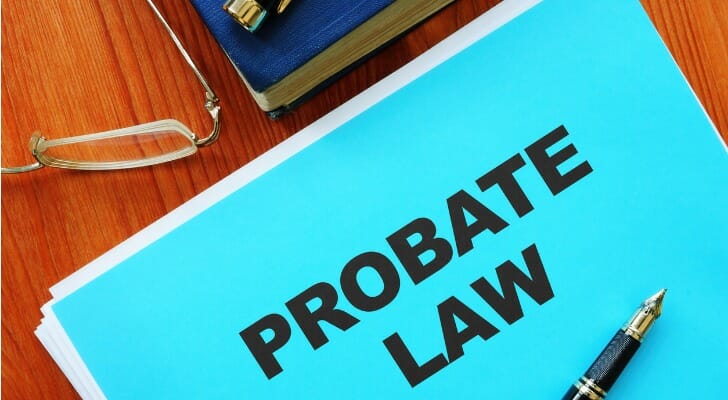If you own any property at all, you probably know about estate planning. You can decide what happens to your assets after you die, of course. But sometimes, people don’t pen a will or trust before they pass. Or, if they do, those legal documents may not be clear in directions. They might even have debts that conflict with their wishes. These situations can lead to probate, which can be time-consuming, though the actual length depends on several factors. Here’s what you need to know about probate.
A financial advisor can create an estate plan to help you avoid probate.
What Is Probate?
Probate is a legal process in which a deceased person’s estate is settled and distributed under the supervision of a probate court. In order to determine how to distribute assets to heirs, the court will authenticate your will (if you have one) and name an executor to supervise the probate process. The executor of estate, or the estate representative, tends to be the decedent’s closest blood relation or another living relative.
How Does Probate Work?
The process typically begins when the individual’s will gets submitted to probate court to confirm its authenticity. If there is no will, the court will appoint an executor or administrator to handle the estate. The executor is responsible for identifying and inventorying the deceased person’s assets. These can include real estate, bank accounts, investments and personal belongings.
If there are any debts left behind, the court will use these assets to pay off those debts. The remaining assets will then get distributed to the beneficiaries according to the terms outlined in the will, or the state’s intestacy laws when there is no will.
Throughout the process, the court will oversee the executor’s actions to ensure a fair and lawful distribution of the estate.
How Long Does Probate Last?
Probate takes time to ensure everything is dealt with according to the law. As a result, it can take from a few months up to over a year. The overall length of the process will vary, based on the situation and where the estate is located. Here are six common factors that will determine how long it takes:
Estate Size
The size of an estate can lengthen the the timeline of the process. Assets tied to the estate could require specific considerations and paperwork. However, certain states use the total value of the estate to determine its size instead. Calculating this depends on state-level laws and the type of assets included, namely probate and non-probate assets.
Possessions subject to probate include:
- Personal property like valuables
- Cash and cash accounts that are not transfer-on-death (TOD) accounts
- Transferable assets without beneficiaries
- Assets with shared ownership or tenancy in common (TIC)
- Real estate
Possessions not typically subject to probate include:
- Insurance proceeds
- Assets or accounts with a joint tenant with right of survivorship
- Accounts that have a beneficiary or TOD designation
- Trusts (and the assets included)
Some states allow shorter probate processing or waive it altogether for low-value properties. For example, Indiana has a small estate limit of $50,000, which only includes assets subject to probate. Beneficiaries can fill out a small estate claim form (or an affidavit for transfer of personal property) and avoid probate for estates below that value.
State Laws
Probate is not nationally regulated, and state-level laws vary. So, probate in one state can go relatively quickly, like a few weeks. Others can last up to two years. Some states have made efforts to simplify that by adopting the uniform probate code (UPC). Its goal is to streamline the probate process by creating standardized laws. In total, though, only 18 states have adopted the code, some just in part.
However, if a decedent owned assets in multiple states, the timeline will increase, even if both use the UPC. That’s because beneficiaries and executors have to go through secondary probate proceedings, called ancillary probate, in the non-primary state as well. For example, this might happen if the deceased owned a vacation home.
In-Fighting Among Heirs
State laws and assets complicate things, but so do heirs. Multiple beneficiaries can slow down the probate proceedings. In particular, conflict can drag out an otherwise smooth legal process since disagreements can lead to delays or even a full stop. Even small disputes can contribute to this, such as arguments over cosmetic changes to a home before sale.
Beneficiaries with personal ties to the estate can all have different viewpoints, drawing out the process and making it more emotionally difficult. Beneficiaries may hire attorneys as well, which can also lengthen the process.
Absence or Presence of a Will
A will usually makes probate faster. A clear and detailed will leaves directions that are easy for the court and executor to follow. But while some wills help you avoid probate, others can’t.
If the decedent passed with debts, then creditors need to be paid using assets from the estate. The court helps organize those payments before distributing the rest of estate’s assets. Alternatively, a will may have mistakes or seem vague. For example, a decedent may overlook non-physical assets or create a DIY will that’s found invalid. Beneficiaries can try to contest a will if they think it’s invalid, but not only does that slow things down, it can be costly and ultimately decrease the estate’s value.
A lack of a will means there is no guidance from the decedent. So, the court and executor have to work through the estate and distribution from scratch.
The Estate Includes a House
Houses could lead to probate. Homes are often sold as a way to repay debts or dissolve the estate to distribute assets. The timeline for selling property can vary with market conditions and other variables influencing the process. The family must wait for a court-appointed executor before they can even prepare the home to sell – everything from hiring a real estate agent to making repairs could get delayed until then.
On the other hand, handing down the property to an heir goes much quicker than selling. Living trusts and other methods of direct transfer can also help speed everything up.
Debts and Taxes
Taxes and leftover debts are crucial factors in the time needed to close an estate. Transfers to these debtors have to occur before beneficiaries can receive anything.
Generally, after an individual dies, his or her creditors must receive a notice. This notice gives them a deadline to generate any claims for money the estate owed. In addition, some states may require public notice in the newspaper for any unknown creditors, giving them access to a deadline as well. Depending on the state’s laws, the notice may circulate for up to a few weeks.
Each state implements its own deadline. For example, Pennsylvania gives debtors one year to file a claim. By contrast, Texas only allows for four months after written notice. Obviously, the longer the claims period, the longer the delay in the probate process.
Taxes on an estate also can take a while. The estate must receive a closing letter from the IRS and the state taxing authority to close out the probate process. You can expect to receive the former within approximately six months.
Can Probate Be Avoided?
Probate can be lengthy, costly and upsetting to family members. Luckily, there are strategies out there that can help you avoid it.
One of the easiest ways is to create an irrevocable trust or revocable living trust. These help you transfer property to ensure that assets avoid probate.
You can also share ownership of some assets. Joint accounts with a right of survivorship pass on to your partner or the surviving owner after you pass. Married couples often choose to do this. However, this is only a strong method when the first spouse passes. The surviving spouse may want to consider alternatives to protect their assets. Sharing with a child, for example, may expose the funds to the child’s creditors.
It’s also possible to set up TOD or payable on death (POD) designations. These allow you to transfer directly to a beneficiary. POD applies to bank assets, such as savings or checking accounts, whereas TOD works for brokerage accounts and stocks.
Bottom Line

No one wants to go through probate, but it’s sometimes a necessity. As long as you understand what goes into the legal procedure, you can prepare yourself for the long haul ahead. Learning also gives you to knowledge to prepare your estate. A well-constructed estate plan can help you avoid putting your heirs through any stress. If you want to take care of your beneficiaries, speak to an estate planner. They can help you craft a plan that ensures everything you worked for is passed down quickly and peacefully.
Estate Planning Tips
- Estate planning can be overwhelming. Luckily, a financial advisor specializing in estate planning can guide you in creating an estate plan for your specific needs. SmartAsset’s free tool matches you with up to three vetted financial advisors who serve your area, and you can have a free introductory call with your advisor matches to decide which one you feel is right for you. If you’re ready to find an advisor who can help you achieve your financial goals, get started now.
- Participating in the probate sale of a residence requires a clear understanding of how much you can afford to spend. A free calculator will give you a quick estimate of what is possible given your resources.
Photo credit: ©iStock.com/Andrii Dodonov, ©iStock.com/Chris Ryan, ©iStock.com/ladimir Cetinski

